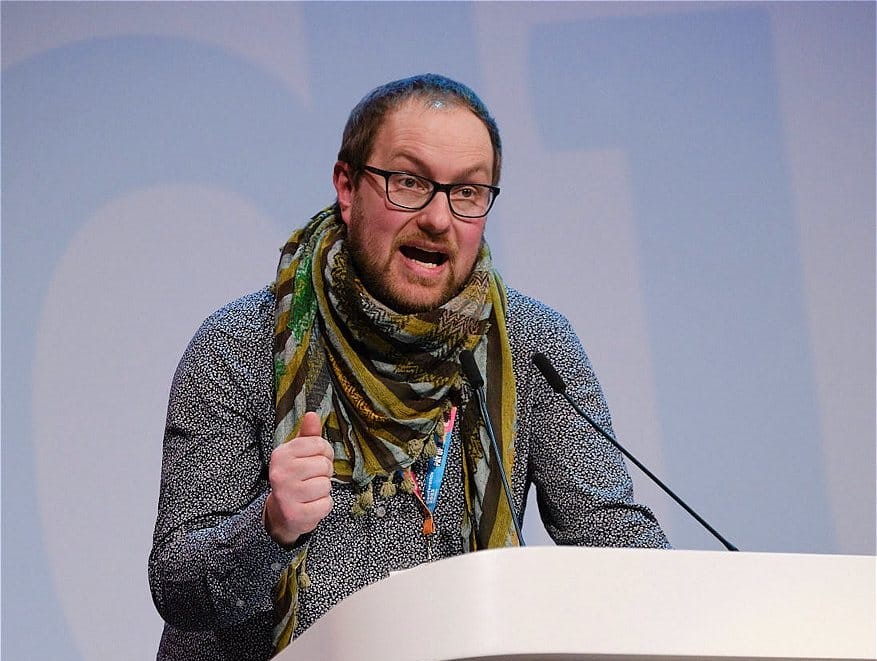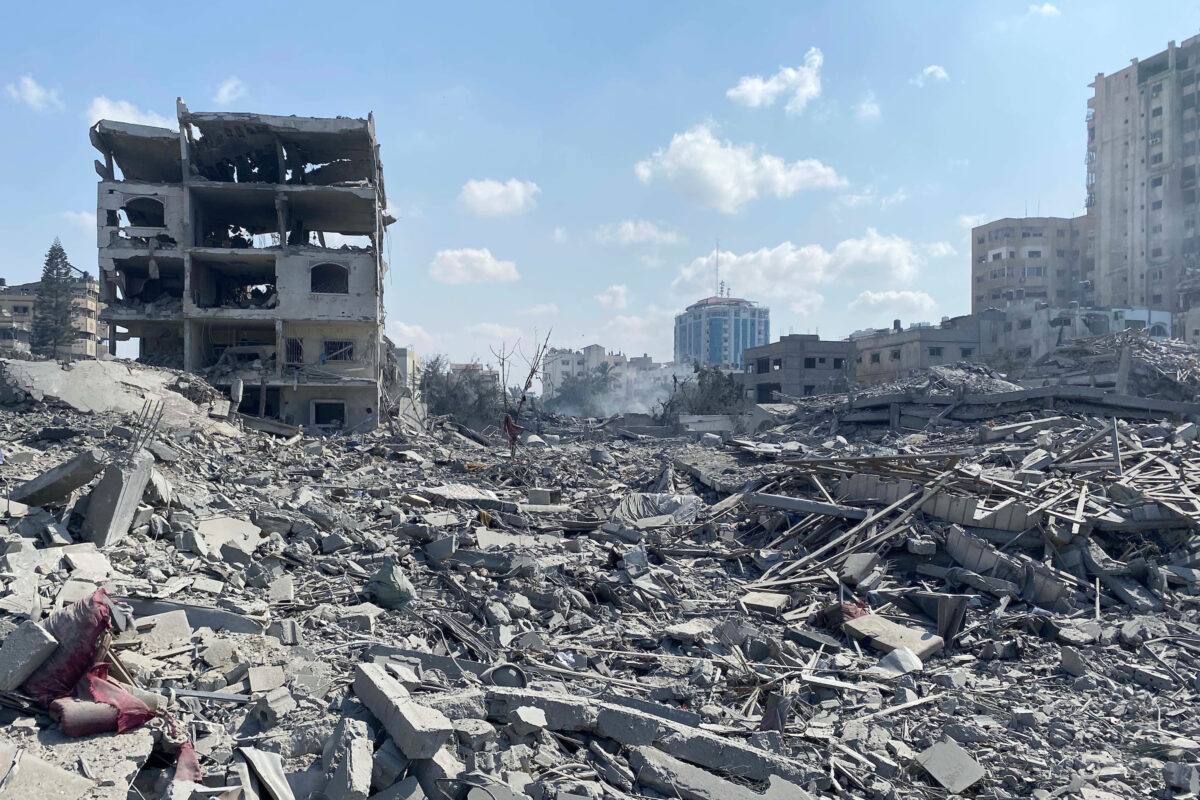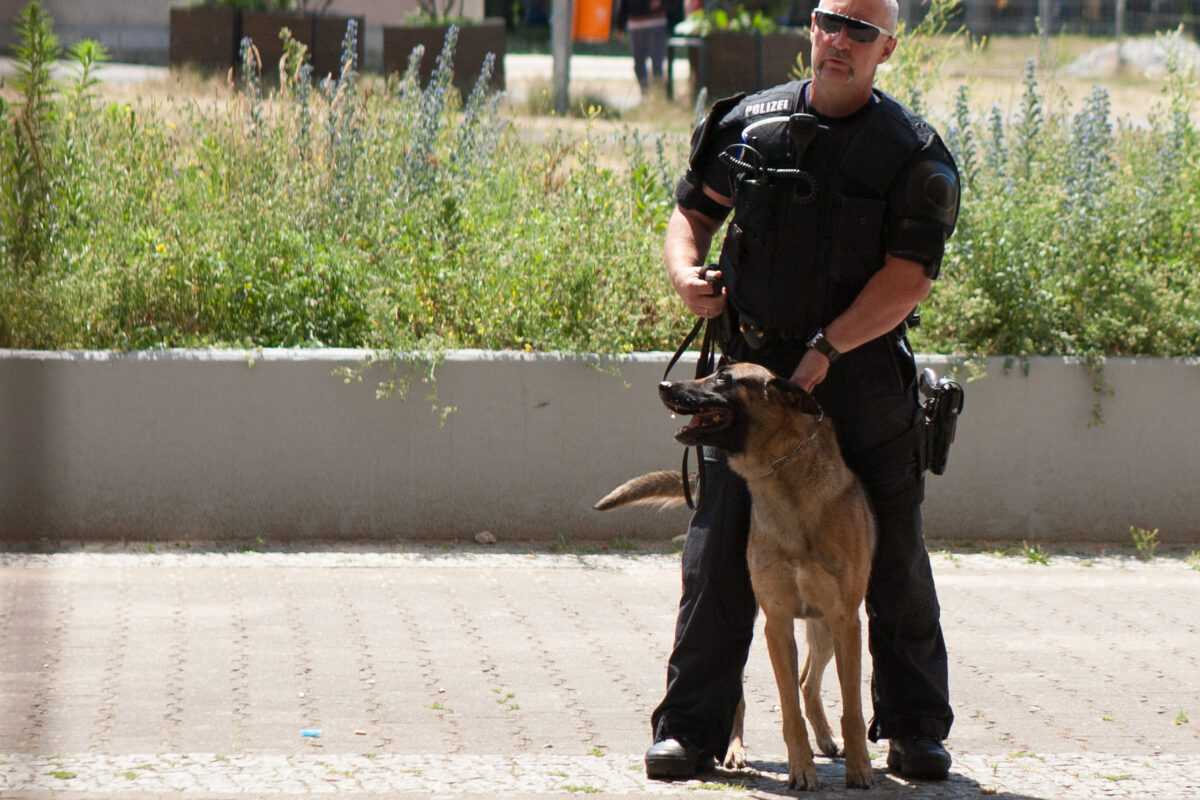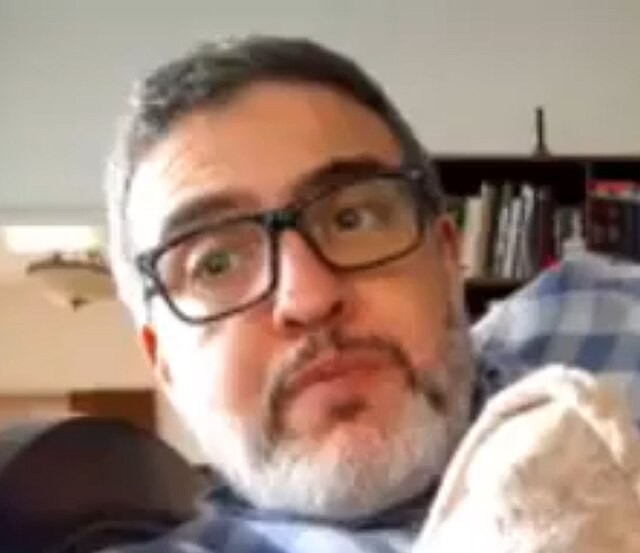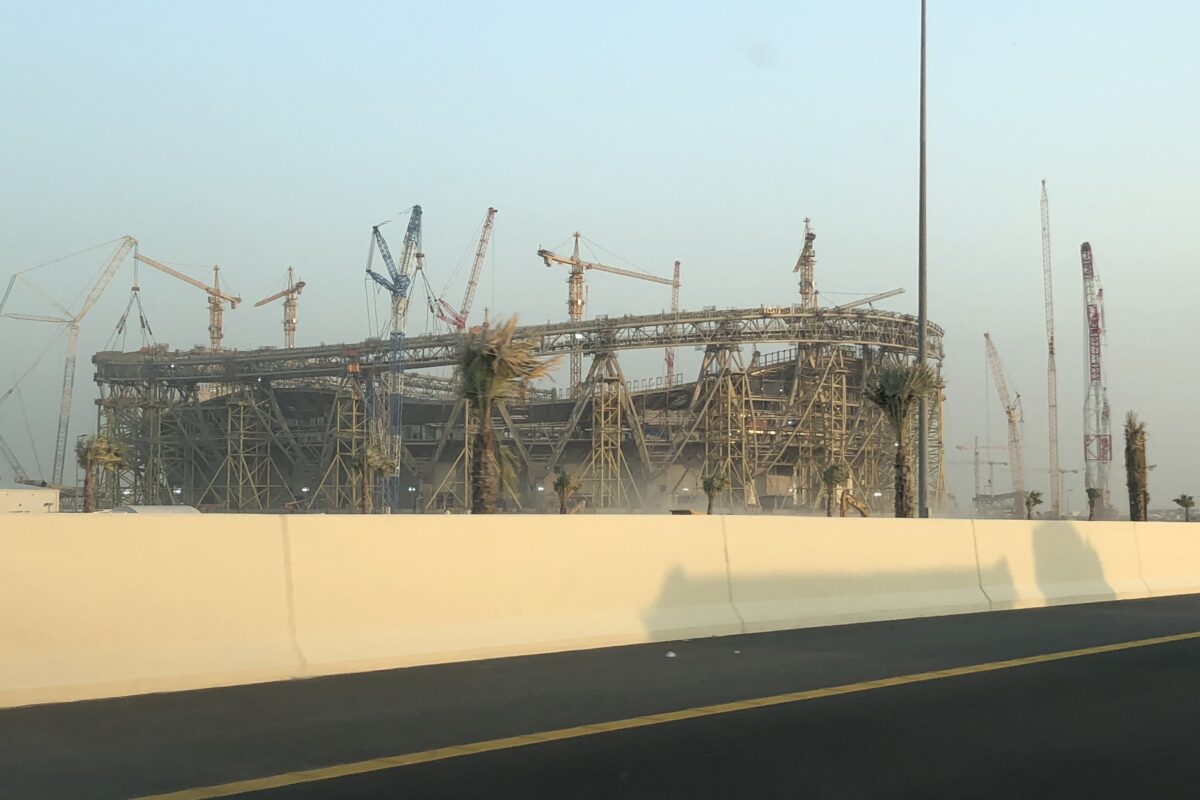Thanks for speaking to us. Could you just start by introducing yourself?
I’m Chris Denson. I’m a teacher in England. And I’m also a member of the National Executive of the National Education union (NEU).
The union executive recently passed a resolution on Palestine. Could you tell me what was in that resolution?
Well, we’ve passed several resolutions over the past few months, because as educators, as people who represent teachers and support children, we see that destruction that’s happening every single day. We see what’s happening to children in that area. We see what’s happening to schools.
So the resolution is quite lengthy. It talks about the fact that over 22,000 Palestinians have been killed – over 7,700 children since this war in Gaza began. It also notes that within two months, not only has every single hospital in Gaza been destroyed, we also believe that every single school has as well.
So no child in Gaza is being schooled at all, never mind the killing that’s going on. In the West Bank, access to schools is really difficult for Palestinian children. They’re routinely stopped on their way to school at military checkpoints. They’re held at gunpoint. They have bullets fired above their heads routinely. The terror that they’re facing is enormous.
As a union, both at local and national level, we’ve agreed that we should be at the forefront of this battle when we see such genocide unfolding in front of our eyes. When we see such human catastrophe, then, as teachers or support staff, as educators, we absolutely can’t stay silent.
Our union has been at the centre of the national demonstrations in Britain. In many of our towns and cities, our members have been talking on those demonstrations. Our General Secretary and President have spoken at the national demos. Key activists have been at the front and centre of those demonstrations to try to push back on what we see happening every day.
We have called a workplace Day of Action for 7th February. At the last workplace day of action, quite a number of our schools did things. We want to widen this and make sure that these activities are happening in as many workplaces as possible. So we agreed to publicize this nationally, to our half million members.
We have put out some ideas for what schools can do. For example, in Coventry, where I work, we had our general meeting last night. Part of the meeting was set aside to discuss what we can do in our schools around Palestine. We’ve also vocally encouraged members to attend demonstrations wherever they can, and to take union banners.
We believe that unions should be at the centre of these pushbacks and are building a series of resources that members can use in schools to educate their students on what’s unfolding in front of their eyes, to support them through it, and to build some kind of resistance to the killing that we’re seeing every single day.
Some people would say that what’s happening in Gaza is tragic, but you’re a British trade union. You should be looking after your members in Britain. What’s Palestine got to do with British teaching unions?
I think Palestine should be central to every trade union around the world.. We don’t look at things in a narrow sectarian way. Within Britain, if we see any other union which is under attack, we support them. Last week, the rail unions were threatened with minimum service levels. We acted on that and sent our solidarity. When we see that migrants in our country are being treated appallingly, as educators and trade unionists we have to roll in behind that.
As a trade union, we should be looking beyond our own national borders. If we see people around the world who are suffering, denied their rights, killed, and brutalized, whether it’s in Palestine or anywhere else, it’s our duty to stand up and be part of the pushback, Many people across the movement would say that if you’re silent, then you’re complicit.
Trade unionists in Britain and Germany, and anywhere else in the world should be shouting from the rooftops when they see what’s unfolding in Gaza.
You mentioned the day of action on 7th February. Could you say a bit more about what will happen? How many people will be involved?
It’s really difficult to say how many people it will involve. We have half a million people in our union across around 25,000 schools. We are writing to every single member and every single group to try to get things going on in those schools. We don’t know exactly how many will do that. But we hope that thousands of schools will get involved.
They could do various different things. When we had our discussion at a big meeting yesterday, we talked about what I’ve done in our school. We’ve run a series of assemblies for the children. We’re setting up working parties with student leaders to raise money for Save the Children in Gaza. We’re setting up safe spaces, so children can come and speak to us and speak to each other about it.
Where that’s not possible, we can call members’ meetings, get the whole staff together and show videos from the General Palestinian Teachers’ Union. We can look at how staff can start to raise money for Gaza. Whenever we speak to people from Gaza or the West Bank, they always tell us that aid and support is brilliant. But the biggest thing they want from us is to not stay silent – for Palestine to be a part of everybody’s conversation.
If the conflict continues, we hope for future days of action that will build and build. The more places we can get those conversations going, the more pressure we can apply to hopefully end the
the abuse that we’re seeing every single day. The treatment of the Palestinian people goes far beyond what happened in October. It’s 75 years of brutal occupation.
Your resolution mentions Prevent. For people who aren’t closely following British politics, could you explain what Prevent is and what it has to do with Palestine?
Prevent is something that was brought in under the last Labour government. It is supposed to be an anti-radicalization tool. If children are being radicalized, then schools are supposed to report any problems. This then gets picked up by the government and the police.
In reality, it doesn’t work that way. Many of the Prevent referrals are not to do with radicalization. They are about children in school with Palestine flags or badges, or parents raising money for Gaza. If you have a level of humanity, you want to do something to protect or to raise money for people who are undergoing the worst humanitarian crisis in the world. Absolutely none of this is anywhere near radicalization.
We know that when our children are seeing images every single day on the mainstream news and TikTok, they will want to come in and talk to people that they trust about those issues. The chilling effect of Prevent is that it drives these conversations underground. Children do not feel able to come to school and talk to their teachers.
It isn’t just the NEU saying this. Amnesty International has been absolutely clear that the Prevent agenda within Britain has had an absolutely chilling effect on human rights. We’ve seen instances over many years now where children have raised things, and tiny conversations that should happen in schools end up with police knocking on their parents’ door.
One child drew a picture of their family in their house, and wrote on the paper: “terrorist house”. The police turned up at their door, and terrified them and their parents. What actually happened was the child meant to write “terraced house”, but spelt it wrong. We know that if that was a white child who made a spelling mistake, there is no way that the police would have been involved.
We had another child who drew their dad holding a banana in his hand. The teacher thought it was a gun. Rather than having the conversation with the child. It was reported to Prevent, and the police ended up knocking on their door.
Prevent has an absolutely chilling effect on stopping the kinds of conversations that should be happening in our schools. If children are seeing these things, or even if they are being radicalized, the best thing for us to do is to provide spaces for them to come and talk to us as highly qualified professionals.
Prevent silences that. It is an absolutely blunt tool which is used to target Muslim communities and to try to police any kind of views that veer away from the government accepted norm. NEU feels that it does enormous damage to our communities and to the children in our schools.
Back to the NEU resolution. You helped introduce an amendment talking about Yemen. What does Yemen have to do with Palestine?
Yemen has a huge amount to do with Palestine. One of the things that concerns us the most is that we’ve seen children being murdered every single day. Children are being bombed on a tiny strip of land in Gaza. In the space of two months, we’ve seen one and a half times the destructive power of Hiroshima and Nagasaki combined dropped on Gaza.
We’ve seen every hospital destroyed. We’ve seen every school destroyed. We see people killed every six minutes. We see five children die every hour. Two mothers die every hour. Ten children every day are having amputations without anaesthetic, and our government is doing nothing to intervene.
Yet in the same time frame, Houthi rebels who are trying to disrupt ships carrying arms to Israel are seen worthy of military intervention. A bit of trade trumps children being murdered every single day.
If this was about upholding international law, we wouldn’t have been selling arms to the Saudis to drop on the Houthis for years. We wouldn’t be standing by and watching children being massacred, day after day after day in Gaza, Our government intervenes because it’s clearly an attempt to assert who really is in charge in the Middle East.
That is why the link to Palestine is so key for us, we can see clearly what is happening. It’s not about international law. It’s about international control of that entire area. It’s no surprise that the US and the UK getting involved in this while letting the destruction of Gaza happen every single day.
What can trade unionists in Germany concretely do about Gaza?
It’s a very difficult situation. But things move all the time. In Britain, what we’ve been able to do in trade unions and beyond has moved significantly. In the immediate aftermath of October 7th, it was much more difficult. But people now see the destruction happening in front of their eyes every day. I’ve heard it called a genocide that’s being live streamed.
Whether we’re in Germany or Britain, we have to look at the situation that we’re in. I know that Germany has a historical contexts that makes it more difficult, and that the discussion isn’t as widespread, but we always have to look at how can we push the boat a tiny bit further.
It’s one thing to go from nothing to mass demonstrations. but can you start to have small meetings in schools, where people start to talk about Gaza? Can you start to have discussions in the wider trade union movement about what can be done? It’s just important that everybody looking at this tries to think what is the next step that I can move to?
Not everyone has to be at the exact same point within a week. But every single person who’s involved in the movement can think: “what is the one thing I can do to shift it on a little bit further? Can I get a meeting set up in my school? Can I get a meeting of staff going in our university? Can we work with students in the university to get meetings on this issue?”
Whatever it is, those steps need to be taken and the more the dialogue shifts, then the more bigger organizations like trade unions can start to make ground on this as well.
Is there anything that German trade unionists can do to support the NEU and your day of action?
Messages of solidarity are always good, particularly with issues like this where there is such a fight back. Even something as simple as a message saying “we back your action. We believe that you’re doing the right thing” is really powerful.
Obviously, if days of action can be proposed in other countries, then those would go down incredibly well. But on the most simple level, from members or trade union groups in workplaces or trade unions as a national body, solidarity is so important. Not just for us, but these actions will be seen by the people of Gaza. This makes such a difference.
